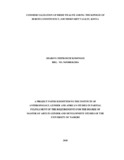| dc.description.abstract | This study was carried out in Bureti Constituency, Kericho County, Kenya. The study
examined the commercialization of bride wealth among the Kipsigis community.
More precisely, the study looked at the forms of bride wealth among the Kipsigis, the
factors that have led to its commercialization and the potential influence of the
commercialization of bride wealth on the status of women. Data were collected using
semi-structured interviews, case narratives, focus group discussions and key
informants interviews. The study reveals that the custom of bride wealth has
transformed from being a mere cultural practice to a highly commercialized venture.
It was established that certain socio-economic variables, for instance, the bride’s level
of education, employment and the status of the groom or his family, determine the
amount of bride wealth expected to be paid. This way uniformity in payment that
existed traditionally has been eroded. The findings indicate that the main factors
responsible for the commercialization of bride wealth in this area are modernization,
economic forces, scarcity of land and capitalism. Moreover, it was established that the
commercialization of bride wealth promotes gender-based violence among married
couples. This emanates from the hefty bride wealth which causes husbands to ill-treat
their wives. Additionally, once bride wealth has been paid most men feel they have
bought their wives and so have the right to use and misuse them. This custom also has
implications for women’s reproductive health rights and their access to and control
over resources. The study concludes that the commercialization of bride wealth
perpetuates oppressive gender relations where women are pushed to the subservient
positions to their male counterparts. This study, therefore, recommends that advocacy
campaigns should be conducted in order to sensitize the public on the importance of
gender equality in marriage irrespective of how much is paid as bride wealth. These
campaigns should aim at educating the public on how bride wealth is a breeding
ground for gender discrimination in regard to access and control over resources and
reproductive health matters | en_US |



